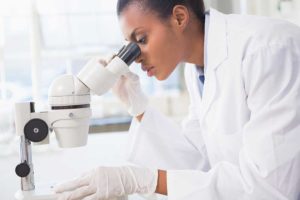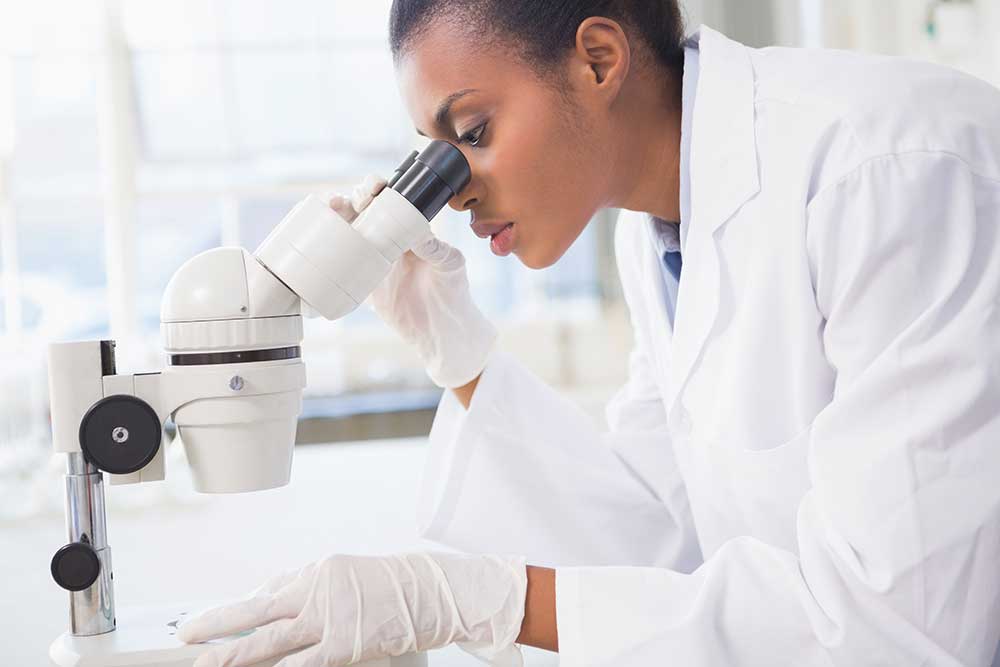Disclaimer: The information on our website is provided for general information purposes only. We make no representations or warranties of any kind, express or implied, about the completeness, accuracy, reliability, suitability or availability with respect to the website or the information contained on our website for any purpose. Any reliance on such information is therefore strictly at your own risk and we are not liable for any damages or losses arising out of or resulting from your reliance on any information contained on our website.
A biochemist collects, analyzes, and interprets results on various topics. Primarily though, a biochemist studies the chemistry of living processes at molecular and cellular levels such as cell development, reproduction, death, and even metabolism. Biochemists study the chemical and physical properties of cells by using electron microscopes.
Watch a video to learn what a biochemist does:
How to Become a Biochemist

Most biophysicist earn a Ph.D. However, to do so, you start by earning a bachelor’s degree in chemistry, mathematics, or physics. After earning a bachelor’s degree, you can work as a biophysicist technician or as an assistant. However, if you want the title of a biophysicist, you must continue your education and earn a master’s degree and then continue on to earn a doctoral degree. These degrees will allow you to work in applied research and product development, and only after obtaining a doctorate, can you work independently as a biophysicist.
Coursework for your Bachelors degree usually includes math and computer science classes to teach you complex data analysis. Most programs include required laboratory coursework. Ph.D. programs typically have advanced coursework such as toxicology, genetics, and bioinformatics. These programs also provide additional training in the planning and execution of research projects. Most universities also require students to write a thesis before graduating and defend it in front of academic professors or scientists that specialize in the chosen topic.
You can also gain experience by obtaining an internship or fellowship within a biophysics laboratory while earning your degree, thus can assist in obtaining an entry-level position in the industry. Internships with companies such as pharmaceutical and medicine manufacturers, can also help you gain knowledge and allow you to network with individuals working in the field.
You must also possess analytical skills to conduct scientific experiments, strong communication and written skills for presenting research, and critical thinking skills to conclude from experiments and math skills, especially calculus and statistics. Perseverance is a crucial characteristic, because you must be thorough in your findings and be able to expect trial and error results, in addition to time management skills.
Job Description of a Biochemist
A biophysicist learns about organisms through the use of physics and biology. Sometimes this is also known as molecular science because the primary goal is to understand and interpret various biological functions and interactions at a molecular level. Biophysicists mostly work in laboratories to conduct their research. They collect, analyze, and interpret research. At times they may also manipulate their studies to see differing factors that affect molecular development on organisms. They use instruments and scientific machines that can be altered and gives them the ability to change research variables. Some biophysicists elect to teach graduate students at universities or other postsecondary schools. Many biophysicists also publish or present their findings in scientific reports or publications or a captive audience.
Biophysicists can be employed by private research institutions, government, universities, or industrial companies. Most work full time and keep regular hours unless they have to meet project deadlines or perform time-sensitive laboratory experiments. Biophysicists typically work in laboratories and offices and can work with dangerous organisms or toxic substances in the laboratory; therefore must follow safety procedures to avoid contamination. According to the Bureau labor Statistic, 10% work for pharmaceutical or manufacturing medicine companies. Related careers are Biomedical Engineer, Biological Technician, or Biochemist.
Benefits of being a Biochemist
You are interested in the career of a biochemist and learning about what a biochemist does and how to become one. Now, let’s go over the benefits of being a biochemist. The benefits of the career of a biochemist are numerous, but we will state the ones they agree are essential, like the opportunity for advancement. Biochemistry has fast job growth, so the doors open to moving into many field areas.
Biochemists can use the skills and knowledge they have gained in any career, and the salary is excellent! That is an attractive benefit. Many biochemists like problem-solving mentally, and this career offers lots of that. Biochemists have job satisfaction in knowing their work is vital to the world. They like the benefit of working indoors instead of in extreme heat or frigid cold. Biochemists also enjoy working with other professionals that have a common interest.
Biochemist Career Video Transcript
Researching a new medical cure… unlocking DNA’s secrets… or developing a more resilient variety of wheat… biochemists and biophysicists study living things and the processes that make them grow, change, and die. These scientists design and conduct experiments, such as testing the effects of drugs, or learning how different cells divide and grow. They may study evolution in plants and animals, nerve cell communication, or how proteins work. Advanced technology is often used on the job, including lasers and fluorescent microscopes.
Biophysicists and biochemists prepare technical reports and research papers, and may make recommendations to a research sponsor. They may also lead laboratory teams and ensure the quality of their work. Conducting scientific experiments takes accuracy and precision, as well as strong math skills, good judgment, and perseverance. The ability to communicate and work with a team is just as essential for these scientists. Biochemists and biophysicists typically work in laboratories to conduct experiments… and in offices to analyze the results.
Most work full-time and keep regular hours. Employers include research and development companies, higher education, and pharmaceutical manufacturing. Biochemists and biophysicists need a Ph.D. to work in independent research and development positions. Some entry-level positions may be obtained with a bachelor’s or master’s degree in the field.
Article Citations
- Bureau of Labor Statistics, U.S. Department of Labor, Occupational Outlook Handbook, Biochemists and Biophysicists.
- National Center for O*NET Development. 19-1021.00. O*NET OnLine.
- The career video is in the public domain from the U. S. Department of Labor, Employment and Training Administration.

